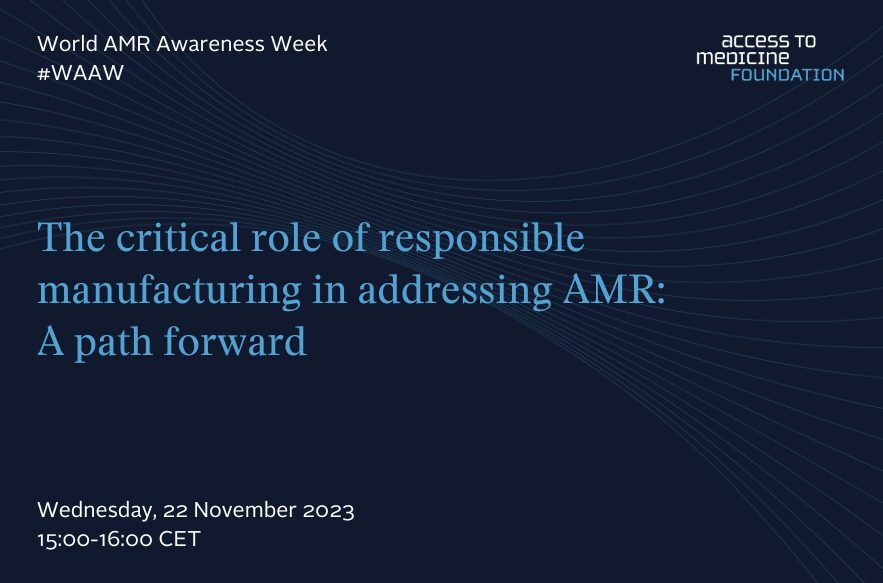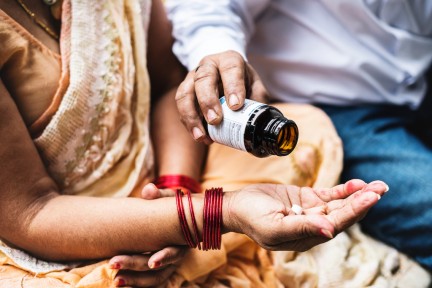What steps are companies taking to help curb AMR by manufacturing responsibly?
By assessing positive examples from selected companies of varying sizes that manufacture and market antibiotics, the report identifies opportunities for progress that their peers can follow. The report specifically mentions Abbott; Aurobindo; Centrient; Fresenius Kabi; GSK; Pfizer; Novartis and its generics division, Sandoz; Shionogi; Teva; and Viatris.
While steps taken by these companies – both at their own manufacturing sites and those of their suppliers – demonstrate progress is possible, more companies need to act now for industry-wide change to take effect.
The report also demonstrates how proactively adopting and scaling responsible manufacturing practices is a critical way for companies to curb AMR while also safeguarding their business for the future, especially considering how the global policy and procurement landscapes are shifting.
“The Access to Medicine Foundation’s report on Antimicrobial Resistance and Responsible Manufacturing is a welcomed and much-needed analysis. This is a major changemaking tool for all sectors - and shows that leadership, collaboration and innovation can improve antibiotic supply chains and curb the drivers of AMR and its impact on our shared environment. I invite all stakeholders to dive into the report and use these findings to make antibiotic manufacturing more sustainable for all.”
Webinar: The critical role of responsible manufacturing in addressing AMR: A path forward
In recognition of the World AMR Awareness Week 2023, the Access to Medicine Foundation hosted a live webinar in collaboration with the World Health Organization, to discuss how we can move forward in ensuring pharmaceutical companies manufacture responsibly to limit the risk of antimicrobial resistance.
AMR already kills millions of people worldwide each year, and this global health threat is rising faster than predicted. With the need to tackle AMR growing ever more urgent, it is critical to consider all the various drivers that can fuel drug resistance. This includes the release of antibiotic waste into the environment, as is the case during antibiotic manufacturing.
In particular, if manufacturing wastewater that is released into rivers and waterways contains high levels of active pharmaceutical ingredients (APIs), it poses a serious risk to the spread of AMR.
It is therefore vital than when manufacturing antibiotics, pharmaceutical companies engage in responsible manufacturing practices that limit their impact on AMR and the environment.
Spotlight on pharmaceutical companies’ responsible manufacturing practices
As part of the three iterations of the AMR Benchmark (2018, 2020, 2021), the Foundation has tracked pharmaceutical companies' efforts to limit AMR by manufacturing responsibly. Despite progress, significant gaps remain – which is why this latest report has been developed by the Foundation's AMR Programme.
To enable and foster progress on responsible manufacturing, the report analyses responsible manufacturing more closely, identifying clear examples from companies that are developing practices to limit AMR risk from manufacturing more effectively.
By assessing selected companies of varying sizes that manufacture and market antibiotics, the report identifies opportunities for progress that their peers can follow. The report specifically mentions Abbott; Aurobindo; Centrient;* Fresenius Kabi; GSK; Pfizer; Novartis and its generics division, Sandoz;* Shionogi; Teva; and Viatris.
Pharmaceutical companies like these, which hold market authorisations for antibiotics, are uniquely positioned to drive change across the antibiotic supply chain, and can help transform the industry. Not only can they prioritise responsible manufacturing at the manufacturing sites they own and operate, but they have the ability to influence the standards and practices of the various third-party suppliers they contract in the production of their lifesaving medicines.
“The role of the pharmaceutical industry in tackling AMR has never been more critical. Responsible manufacturing is among the ways in which they can help prevent drug resistance from becoming uncontrollable - and can ensure that the production of their lifesaving antibiotics does not cause unintended harm to human health or the environment. We have seen that progress is possible, but we now need more companies to seize the opportunities we have identified to accelerate industry-wide change.”
What did the report find?
To support and enable progress on responsible manufacturing, the report identifies three specific areas that companies need to focus on to strengthen their responsible manufacturing practices and limit AMR risk more effectively.
Employ effective methods to limit AMR risks
Specifically, to minimise AMR risk more effectively, companies can develop and implement comprehensive methods to ensure the safety of their wastewater before it is released into the environment, as demonstrated by four companies in scope.
Centrient and Shionogi show that reaching compliance in wastewater before releasing it is feasible. Notably, Centrient reports achieving this at its site in Tonsa, India, and in consultations for this report, Shionogi stated that it complies with discharge limits directly in its wastewater for all five of the antibiotics it manufactures.
Sandoz uses a membrane filtration process at its main antibiotic manufacturing site in Kundl, Austria, to remove bacteria from its wastewater. To more accurately determine whether discharge limits are being met, Abbott’s pharmaceuticals division implements a synergistic combination of the mass balance approach and analysis of wastewater samples.
Promote compliance with discharge limits across the antibiotic supply chain
Encouragingly, Centrient, GSK, Pfizer and Shionogi report that the majority of their supplier sites have achieved compliance in receiving waters. While Centrient and Shionogi do have a smaller number of supplier sites, GSK and Pfizer demonstrate that achieving compliance on a larger scale is also possible.
Companies can also share resources, expertise and analytical capabilities to support suppliers in achieving compliance with discharge limits, as demonstrated by Abbott, which provides its suppliers with wastewater sample analysis free of charge.
Disclose actions transparently
To foster progress, and to encourage other companies to follow suit, companies need to report progress at their own sites and those of their suppliers.
However, to date overall transparency has been lacking. While Centrient, GSK, Shionogi, Teva and Viatris publicly report specific details on their waste management practices, only Shionogi provides clarity on its antibacterial manufacturing supply chain. Critically, no company currently reports actual antibiotic discharge levels at its own sites or supplier sites.
What's next?
As demonstrated by the most up to date, best-in-class examples assessed in this report, progress is possible. Moreover, beyond curbing AMR, engaging in responsible manufacturing practices will also be critical to ensuring business continuity within the context of the wider global health landscape.
Procurers, for example, who can consider criteria related to the environment and sustainability when making purchasing decisions, are increasingly expecting companies to demonstrate comprehensive and effective practices to keep antibiotic waste within limits.
Notably, three companies in scope of the report – Fresenius Kabi, Sandoz and Viatris – were awarded with tenders as part of the Norwegian Hospital Procurement Agency’s 2019 sustainable pilot procurement programme. The companies won the tenders partly by achieving the highest score on environmental criteria, which specifically considered whether companies had environmentally friendly production in place to reduce the risk of AMR.
More investors also now view AMR as a systemic risk that needs to be considered within environmental, social and governance (ESG) standard-setting and reporting frameworks. There are also signs that regulation aimed at reducing AMR risk from manufacturing, which is currently lacking, may be introduced, or strengthened, in several countries.
By following the recommendations in the report, pharmaceutical companies can ensure the production of their lifesaving antibiotics do not contribute to AMR, or negatively impact the environment, while proactively responding to stakeholders that are increasingly expecting them to demonstrate their commitment to responsible manufacturing.
*Centrient is a business-to-business provider of antibiotics and antifungals and has not been assessed in any of the three iterations of the AMR Benchmark.
**Novartis has announced that it will separate its generic division, Sandoz, into a standalone company by way of a 100% spin-off, planned for Q4 2023.
About the Antimicrobial Resistance Programme
This report is part of the Access to Medicine Foundation’s Antimicrobial Resistance (AMR) Programme, which works to move pharmaceutical companies in responding to the growing challenge of drug-resistant infections. The AMR Programme’s publications – including both the AMR Benchmark (published in 2018, 2020 and 2021) and targeted thematic reports such as this – focus on how pharmaceutical companies perform in terms of taking action on identified priorities to address AMR.

Marijn Verhoef
Director of Private Sector Engagement
mverhoef@accesstomedicinefoundation.org
Get in touch

